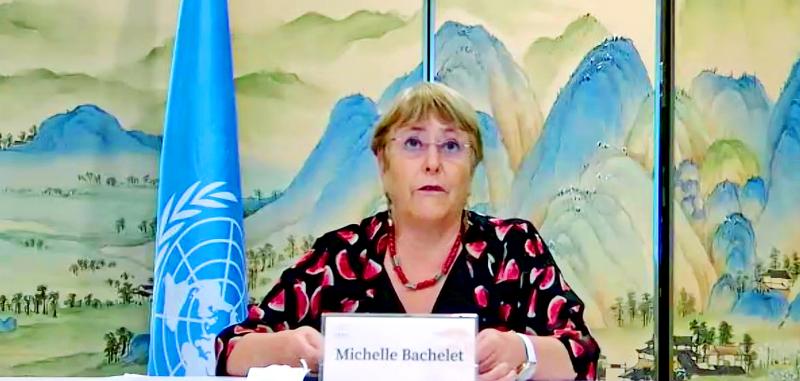UN High Commissioner for Human Rights Michelle Bachelet yesterday said her contentious visit to China was “not an investigation,” and insisted she had unsupervised access during meetings in Xinjiang, where Beijing is accused of widespread human rights abuses.
Bachelet’s long-planned trip this week has taken her to the far-western region, where Beijing is accused of the detention of more than 1 million Uighurs and other Muslim minorities, forced sterilization of women and coerced labor.
Bachelet has come under fire from rights groups and Uighurs overseas, who say she has stumbled into a six-day Chinese Communist Party propaganda tour.

Photo: EPA-EFE
Speaking at the end of her trip while still in China, Bachelet framed her visit as a chance for her to speak with “candor” to Chinese authorities, as well as civil society groups and academics.
“This visit was not an investigation,” she told reporters, later insisting she had “unsupervised” access to sources the UN had arranged to meet in Xinjiang.
It is the first trip to China by the UN’s top rights envoy in 17 years and comes after painstaking negotiations over the conditions of her visit.
Meanwhile, the German Ministry for Economic Affairs and Climate Action has refused to provide automaker Volkswagen with guarantees to cover new investments in China because of concerns over human rights violations in the Xinjiang region, Der Spiegel reported on Friday.
The ministry said it had turned down four applications from a company over human rights concerns in Xinjiang, but declined to name the company.
Der Spiegel said, without naming sources, that Volkswagen was the company in question.
“The human rights situation in Xinjiang has become worse in recent years and involves forced labor and mass internment of Uighurs,” the ministry said. “The German government has therefore decided not to give guarantees for projects in China that are 1) in Xinjiang or 2) have business ties to entities operating there.”
Via a joint venture with China’s SAIC Motor, Volkswagen has a plant in Urumqi, in the Xinjiang region, where western countries and rights organizations say ethnic Uighurs face torture and detention.
A Volkswagen spokesperson said that the company had submitted applications for investment guarantees in China, adding that it had not yet received an official decision from the ministry.
The Volkswagen spokesperson said the applications were not for direct investments in the group’s Xinjiang plant or anywhere near it, but that it could not be ruled out that a product made at a factory elsewhere in the country could end up in the region.

The Ministry of the Interior (MOI) is to tighten rules for candidates running for public office, requiring them to declare that they do not hold a Chinese household registration or passport, and that they possess no other foreign citizenship. The requirement was set out in a draft amendment to the Enforcement Rules of the Public Officials Election and Recall Act (公職人員選舉罷免法 ) released by the ministry on Thursday. Under the proposal, candidates would need to make the declaration when submitting their registration forms, which would be published in the official election bulletin. The move follows the removal of several elected officials who were

The Republic of China (ROC) is celebrating its 114th Double Ten National Day today, featuring military parades and a variety of performances and speeches in front of the Presidential Office in Taipei. The Taiwan Taiko Association opened the celebrations with a 100-drummer performance, including young percussionists. As per tradition, an air force Mirage 2000 fighter jet flew over the Presidential Office as a part of the performance. The Honor Guards of the ROC and its marching band also heralded in a military parade. Students from Taichung's Shin Min High School then followed with a colorful performance using floral imagery to represent Taiwan's alternate name

FOUR DESIGNATED AREAS: Notices were issued for live-fire exercises in waters south and northwest of Penghu, northeast of Keelung and west of Kaohsiung, they said The military is planning three major annual exercises across the army, navy and air force this month, with the navy’s “Hai Chiang” (海強, “Sea Strong”) drills running from today through Thursday, the Ministry of National Defense said yesterday. The Hai Chiang exercise, which is to take place in waters surrounding Taiwan, would feature P-3C Orion maritime patrol aircraft and S-70C anti-submarine helicopters, the ministry said, adding that the drills aim to bolster the nation’s offshore defensive capabilities. China has intensified military and psychological pressure against Taiwan, repeatedly sending warplanes and vessels into areas near the nation’s air defense identification zone and across

A Chinese takeover of Taiwan would severely threaten the national security of the US, Japan, the Philippines and other nations, while global economic losses could reach US$10 trillion, National Security Council Deputy Secretary-General Lin Fei-fan (林飛帆) wrote in an article published yesterday in Foreign Affairs. “The future of Taiwan is not merely a regional concern; it is a test of whether the international order can withstand the pressure of authoritarian expansionism,” Lin wrote in the article titled “Taiwan’s Plan for Peace Through Strength — How Investments in Resilience Can Deter Beijing.” Chinese President Xi Jinping’s (習近平) intent to take Taiwan by force